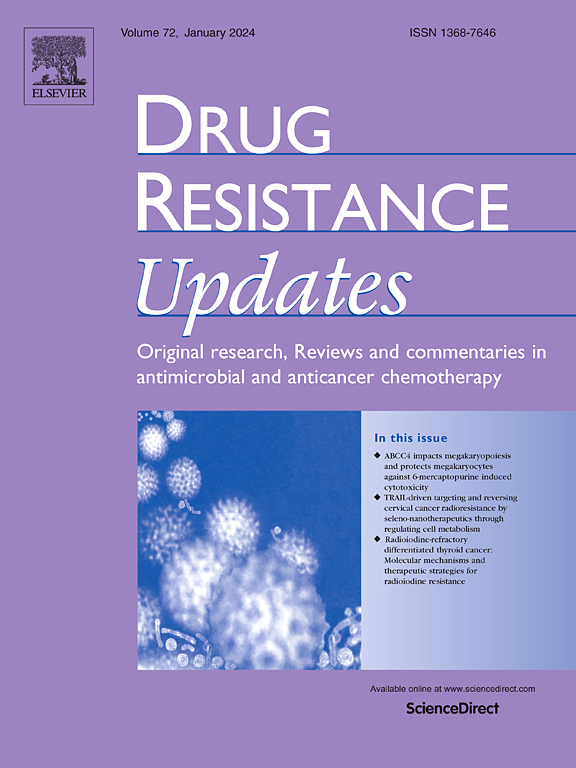耐药性中的微生物群
IF 21.7
1区 医学
Q1 PHARMACOLOGY & PHARMACY
引用次数: 0
摘要
耐药性,特别是抗癌药和抗生素的耐药性,对疾病治疗构成重大挑战,严重影响治疗效果和患者存活率。近年来,越来越多的研究强调了微生物群在促进或减轻耐药方面的双重作用。微生物群与宿主共生,在维持机体生理功能和调节机体免疫应答中发挥着至关重要的作用。然而,微生物群落内的生态失调可能诱发或加剧耐药性。虽然抗生素介导的肠道微生物群消耗已被提出作为对抗耐药性的策略,但它可能矛盾地导致耐药性增加甚至恶化治疗结果。本文以抗癌药和抗菌药物为代表,阐述微生物组与耐药的关系。我们提供了一个详细的讨论机制,微生物生态失调有助于发展的耐药。此外,我们系统地总结了以微生物群为目标的治疗策略的最新进展,包括粪便微生物群移植、益生菌和益生元以及细菌工程方法。最后,我们讨论了微生物群调节策略在克服耐药性方面的潜在临床应用,并分析了该领域当前面临的挑战和未来的研究方向。本文章由计算机程序翻译,如有差异,请以英文原文为准。
Microbiota in drug resistance
Drug resistance, particularly those of anticancer drugs and antibiotics, poses a significant challenge in the treatment of diseases, severely compromising therapeutic efficacy and patient survival rates. In recent years, an increasing number of studies have highlighted the dual role of microbiota in either promoting or mitigating drug resistance. The microbiome exists in symbiosis with the host, playing a crucial role in maintaining physiological functions and regulating immune responses. However, dysbiosis within the microbial community may induce or exacerbate drug resistance. While antibiotic-mediated depletion of gut microbiota has been proposed as a strategy to combat resistance, it may paradoxically lead to increased resistance or even worsen treatment outcomes. In this review, we focus on anticancer and antimicrobial agents as representative examples to elucidate the association of microbiome and drug resistance. We provide a detailed discussion on the mechanisms by which microbial dysbiosis contributes to development of drug resistance. Additionally, we systematically summarize the latest advancements in microbiota-targeted therapeutic strategies aimed at overcoming resistance, including fecal microbiota transplantation, probiotics and prebiotics, and bacterial engineering approaches. Finally, we discuss the potential clinical applications of microbiota-modulating strategies for overcoming drug resistance and examine the current challenges and future research directions in this field.
求助全文
通过发布文献求助,成功后即可免费获取论文全文。
去求助
来源期刊

Drug Resistance Updates
医学-药学
CiteScore
26.20
自引率
11.90%
发文量
32
审稿时长
29 days
期刊介绍:
Drug Resistance Updates serves as a platform for publishing original research, commentary, and expert reviews on significant advancements in drug resistance related to infectious diseases and cancer. It encompasses diverse disciplines such as molecular biology, biochemistry, cell biology, pharmacology, microbiology, preclinical therapeutics, oncology, and clinical medicine. The journal addresses both basic research and clinical aspects of drug resistance, providing insights into novel drugs and strategies to overcome resistance. Original research articles are welcomed, and review articles are authored by leaders in the field by invitation.
Articles are written by leaders in the field, in response to an invitation from the Editors, and are peer-reviewed prior to publication. Articles are clear, readable, and up-to-date, suitable for a multidisciplinary readership and include schematic diagrams and other illustrations conveying the major points of the article. The goal is to highlight recent areas of growth and put them in perspective.
*Expert reviews in clinical and basic drug resistance research in oncology and infectious disease
*Describes emerging technologies and therapies, particularly those that overcome drug resistance
*Emphasises common themes in microbial and cancer research
 求助内容:
求助内容: 应助结果提醒方式:
应助结果提醒方式:


